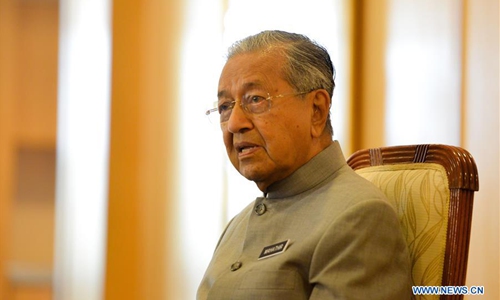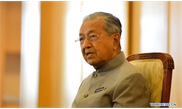Mahathir’s resignation will have little impact on Malaysia’s policies toward China

Malaysian Prime Minister Mahathir Mohamad Photo: Xinhua
Malaysian Prime Minister Mahathir Mohamad's submission of resignation would have little impact on Malaysia's policies toward China, as it is in line with Malaysia's interest to keep them constant and stable, Chinese analysts said.Mahathir resigned Monday in a shock move after his political allies sought to form a new coalition in a bid to block the succession of the leader-in-waiting Anwar Ibrahim.
The king accepted his resignation after meeting Mahathir, Chief Secretary Mohd Zuki Ali said in a statement.
"However, His Highness has given his assent to appoint Mahathir Mohamad as interim prime minister, while waiting for the appointment of the new prime minister," Mohd Zuki said.
Zhuang Guotu, head of Xiamen University's Southeast Asian Studies Center, told the Global Times that economic cooperation between the two countries has greatly propelled mutual development, noting no matter how the situation develops and whoever Mahathir's successor is, the Southeast Asian country's China policy remains the same.
Zhang Mingliang, associate professor of international relations at Jinan University located in Guangzhou, Southern China's Guangdong Province, said Mahathir's shock resignation to the King is likely designed to achieve his ultimate goal of forming a new governing coalition.
But the political turmoil may lead to increasing tensions in Malaysia, the experts believe, which will further economic and political uncertainty that may cast a shadow on China's cooperation with Malaysia in the short term. But it will soon stabilize after the unrest in Malaysia is quelled.
The new party coalition framework may completely eliminate any potential threat posed by Anwar Ibrahim's constant pressure over power transition, Zhang said.
The new framework that will not include Anwar and his party's political input, would on one hand introduce United Malays National Organization's resources and successfully divide Anwar's party assets, he added.
Zhang predicted Mahathir remaining Malaysian Prime Minister would be highly likely, but there is also a possibility of laying foundation for the succession of Malaysia's Economic Affairs Minister Azmin Ali.
Anwar and Mahathir - the world's oldest leader, aged 94 - have a stormy relationship but joined forces to win an election in 2018.
Mahathir, who previously served as premier from 1981 to 2003, had made a pre-election pledge to hand power to Anwar but has repeatedly refused to fix a date.
Anwar prefers to bring diversity to Malaysian politics, while Mahathir insisted on putting the interests of the Malaysian United Indigenous Party as the priority, said Song Yanpeng, an expert on Malaysia who is with the Chinese Academy of Social Sciences.

